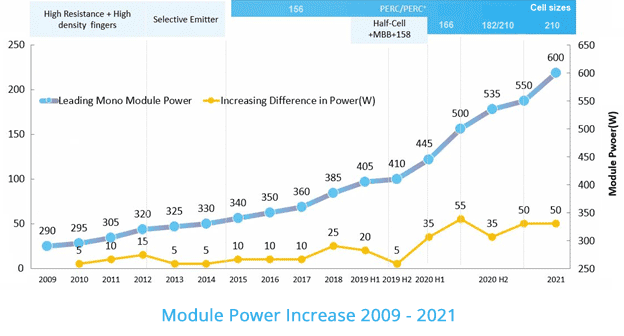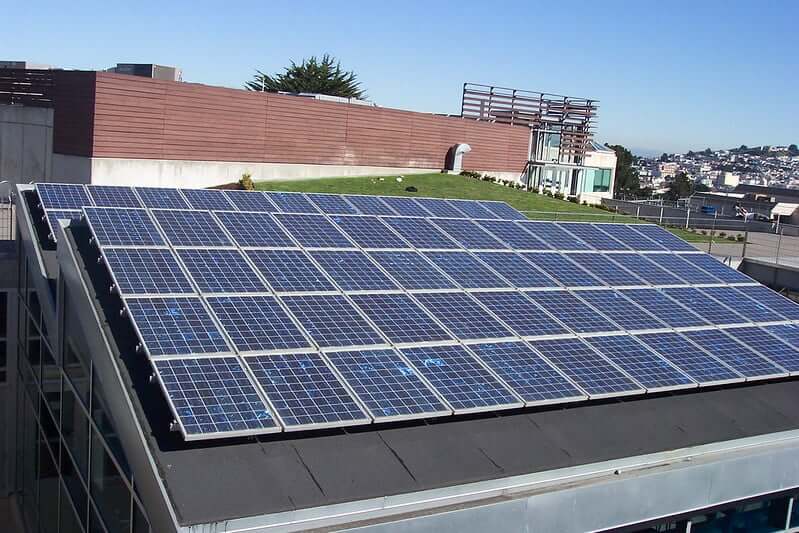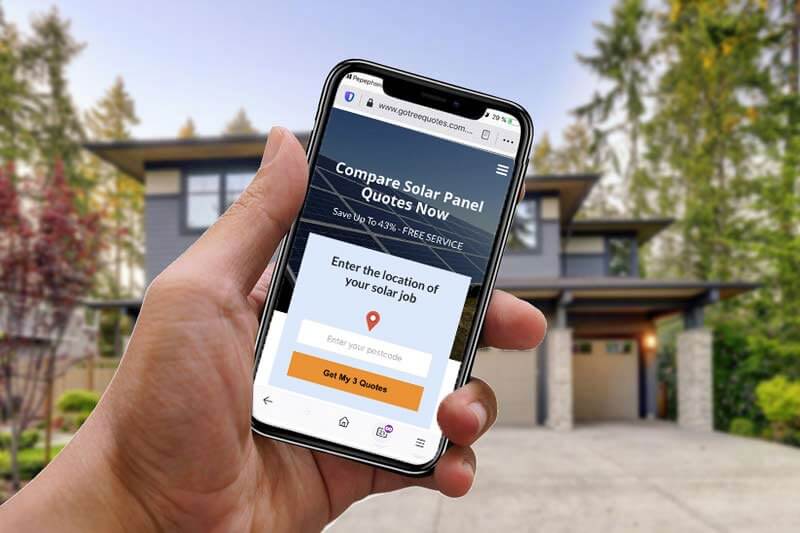Home How Efficient Are Solar Cells
How Efficient Are Solar Cells
The effectiveness of solar panels hinges on how well they can convert sunlight into usable electricity.
Solar panel’s efficiency is about 22.8% on average, ranging from 13 – 22.8%. In Australia, solar panels have a much higher efficiency of 25.54% due to the high amounts of sunshine.
The more efficient a solar panel is, the more power it produces. Different types of solar panel brands have different rates of efficiency. Carry out extensive research before you purchase your solar panels.
Table of Contents
ToggleFactors that affect solar panel efficiency
Manufacturing technology
There are many solar panel manufacturers in the market. Each claims the highest efficiency.
Over time, solar panel manufacturing technology has developed. It has led to highly efficient solar panels.
In the last decade, as manufacturing technology has improved, solar panels have achieved as much as 22% efficiency.
There are three types of solar panels you can get on the market.
- Monocrystalline solar panels
- Polycrystalline solar panels
- Thin film solar panels
Monocrystalline solar panels are made with the purest silicon. They are the most advanced technologically and have the highest efficiency.
Polycrystalline solar panels are not as efficient as monocrystalline solar panels. However, they are more affordable.
Thin film solar panels are based on old technology and are the least efficient of the three types.

Available sunlight
Solar panels convert sunlight into electricity.
Solar panel’s efficiency is affected by the availability of sunlight. The longer the solar panels are exposed to the sun, the more electricity they produce.
In Australia, sun is available all year round. Also, every region have different sunshine than others. Hence, the efficiency of solar panels will vary in different region due to different solar irradiance in every region. Moreover, solar panels will be more efficient in regions where solar irradiance is high.
The CEC has divided the country into four parts based on the amount of solar radiation in each region. Rebates are highly dependent on the potential of solar irradiance. Regions with more solar irradiance enjoy higher rebates than those with the less solar irradiance. Additionally, this is also due to the high efficiency of the panels in the regions of high solar irradiance.
Solar panel installation and orientation
Improper installation of solar panels leads to their loss of efficiency. Thus, you should always hire a professional to install the panels.
One of the factors to consider when installing solar panels is the angle of installation or tilt angle. It is not recommended to install solar panels on flat surfacez or zero angle with the roof. They must be tilted to a particular angle to ensure that they can absorb as much sunlight as possible.
The wrong angle affects the absorptivity of solar irradiance in the solar panels, which also effects the electricity production.
Orientation is the direction in which the solar panels are installed. East-facing solar panels are more efficient in the morning when the sun is in the East. West-facing solar panels are more efficient in the afternoon until the sun sets.
Consult a professional for the best orientation of your solar panels.
Shading
Solar panels must be always be exposed to sunlight to enhance their productivity. Shade reduces the output of your solar panels.
Ensure that, there is no shading effect on the array of solar panels while installation. Moreover, shade of one panel on other affects the productivity of the whole system due to the output productivity dependence of system design.
Shade reduces how much sunlight gets to your solar panels. Consequently, it reduces how much usable electricity they can produce.
A professional installer will carry out a site inspection before panel installation. It gives better understanding to installer to know which parts are affected by shade and how to design the array of solar panels for installation.
Seasons
Different seasons have a different impact on the efficiency of solar panels.
In hot seasons, solar panels are highly efficient due to the availability of sunlight. In cold seasons, the panels produce less electricity due to poor sun exposure.
At night and on cloudy days, solar panels produce less electricity. You will need a solar battery for these days.
A solar battery stores excess power from the solar panels. The stored power can be used when the panels will not producing enough power.
Age and condition of solar panels
Solar panels have a 25-year lifespan. Their efficiency will also be decreased with the passage of time.
Usually, 20% efficiency of solar panels is decreased in the first 10 years of installation. While remaining 80% is decreased with the each passing year.
After 25 years, your solar panels will lose their electricity production capacity and have to be replaced.
Additionally, you will need to clean or remove dust from the surface of your solar panels.
When the dust accumulates, it hinders the amount of sunlight the panels can absorb. It reduces the efficiency of the panels as well.
It is recommended that clean your solar panels at least once every year.
Solar inverters
Solar inverters are the other core component of a solar PV system.
Solar inverters convert the incident Solar irradiance into usable electricity that can power the home lights and run appliances.
Solar PV technology ensures that you will only need a single solar inverter for up to ten solar panels installed on your rooftop.
Thus, you don’t need much space to set up your home power generation station.
Solar panels and inverters are bought together. They are affordable and easy to install if you engage Clean Energy Council-accredited installers.
For a high-efficiency solar system, get the requisite inverter capacity. It will ensure that you have maximum power production at all times.
Benefits of high-efficiency solar PV system
Solar PV System | Matt Montagne | Flickr | CC BY-SA 2.0

Higher amounts of electricity produced
The more efficient solar panels are, the more electricity they produce. Highly efficient solar panels absorb the sun rays easily and produce more power than less efficient solar panels.
Depending on the size of your solar panels, more efficient solar panels will produce more electricity.
Quick ROI
The more efficient a solar panel is, the more power it produces electricity. As a result, the faster you can recoup your investment in the system.
With higher power production, especially for commercial use, Electricity savings in the bill are way more higher. Also, It contribute to a faster recovery of your initial investment.
Additionally, less number of solar panels will be required by using highly efficient panels.
The cost of a solar system depends on the number of solar panels. The fewer panels you require, the less you invest, and the faster your ROI.
Lifetime productivity of the system
High-efficiency solar panels produce more power than lower-efficiency solar panels over the lifetime.
Hence, in order to attain high efficiency, you must have to replace low efficiency panels with high efficiency panels before their estimated lifespan.
Climatic conditions
Depending on the climatic conditions of where you live, high-efficiency solar panels produce power even in less than ideal conditions.
High-efficiency solar panels can produce sufficient electricity for your home even with a few hours of sunlight. They will provide power even on cloudy and cold days.
How to save money when buying solar panels
Buy the right size of solar system for your home
The larger the number of solar panels you purchase, the more you spend.
Assess your electricity consumption or daily power needs before you purchase a solar system.
Buy an upgradeable system
When buying your solar system, it is essential to consider your future power needs.
In the future, you may need a larger-capacity solar system for your home as you may have more power needs.
Talk to your installer so that you can get an easily upgradeable system.
To upgrade your solar system, you may require a few extra solar panels and maybe a battery system.
The additional solar panels will increase of already installed system, Also, the battery system will help to store the excess power to enhance the availability of power when required.
Government incentives
When you purchase a solar photovoltaic (PV) system during the tax year, you are eligible for a Federal Solar Tax Credit that you can claim on your federal income taxes for a percentage of the cost of the system. In 2021, the ITC provided a 26% tax credit for systems installed between 2020 through 2022.
The Federal Solar Tax Credit for 2024 is 30% this is an increase from 26% in recent years and extends through to 2032.
The larger the solar system, the higher the rebate you will likely receive.
You can also get low-interest loans to purchase and install solar panels in your home.
Get quotes from different installers
Before purchasing solar panels, find out how much they cost from different installers.
Different brands of solar panels cost differently, even for the same size of solar panels.
Getting several quotes ensures you know the price range of the required solar system size.
Factors to consider when buying solar panels
Size of solar panel
The size of a solar panel is defined according to its rated power output efficiency. The bigger the solar panel, the higher the price.
Choose a solar panel size based on your power consumption.
Your choice of installer
Different solar panel manufacturers and installers offer different prices for their solar panels.
Before you purchase a solar system, get several quotes from installers. Also, read customer reviews of the different installers that you would want to use.
The brand of solar panel you choose to buy
New brands have been introduced in the market due to the increase adoption rate of solar installation in Australia.
Check the rated efficiency of the solar panels you choose before you buy.
Also, ensure that you buy from an accredited retailer or installer.
Government rebates
New solar panel customers in Australia enjoy government rebates that help to lower the cost of solar panels.
How much you get as a rebate depends on the size of the solar panel that you purchase.
The rebate amount ranges from $1000 to $5,400 depending on the size of the solar panel. The bigger the solar panels the higher the rebate.
Hire a pro to install your solar system
If you want to install a new solar system, here is a free tool that you can use.
Gosolarquotes.com is a free tool that connects homeowners to accredited solar panel installers.
- At the top of the tool, enter your zip code.
- Then, fill out the subsequent form to provide more information on your house size and electricity consumption.
- You will then receive three quotes from professional installers with no obligation to hire them. Compare the quotes and choose one of the installers to install the solar system for you.

Compare Solar Panel Quotes
Table of Contents
Toggle









